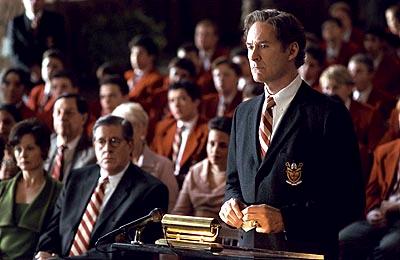 Ralston triumphant.
Ralston triumphant.Though I was quite caught off-guard with director Danny Boyle's visual approach to the film's potentially claustrophobic theme of isolated survival, "127 Hours" is a great showcase of emotions, music (by Oscar winner A.R. Rahman) and imagery, all converging to enhance the raw powerhouse performance by James Franco in what might be the best performance of 2010.
What's very impressive in the film's overall execution is how it has able to merge the momentary pain and suffering of protagonist Aron Ralston (it's a true story, for the uninitiated) while trapped under a boulder with the almost surrealistic longing, self-reflection and intermittently spiraling state of mind of a desperate man victimized by too much free spirit and gutsy individualism. Danny Boyle, after creating a much praised exploration of Indian optimism amidst urban squalor and third-world poverty that is "Slumdog Millionaire", entered a project with a very different emotional arc and injected it with the relentless 'trademark' imagery that made his film "Trainspotting" so popular and 'slick', at least for those inclined for some other cinematic devices other than the narrative.
What resulted is a harrowing tale of both the deterioration of the body and the mind, captured by James Franco with a sense of naturalism and urgent consciousness that the man he's portraying on-screen isn't just an individual akin to a 'T-shirt at best' (borrowing from 'Se7en' there), but a fairly enduring testament of a 'clamor' for life and the will to live, which is more or less, the definitive nature of any straightforward man.
"127 Hours" is by no means a film that offers something new emotionally and aesthetically; in fact, I've seen a considerable amount of films that have utilized such type of editing style (particularly films dealing with postmodernism or at least those who pretend they do) and theme ("Cast Away?"). What makes this film significantly memorable and one of the better pictures of 2010 is its thorough observation of the semantic difference between 'deep' and 'profound': exploring the natural depth of a perilous mountain crevice, the irrevocable consequences to its every chance encounters (the first), and the landscapes of the soul (the latter); the inner recesses of a harmonious alliance between the heart and the mind to hold the words 'I'm giving up' fairly at bay.
'Do not lose it', said Aron Ralston to himself during the critical moments of his 'rocky' predicament. To which he is pertaining to isn't important; it is the fact that whatever it is, he never will and he never did. The generalized proof of human tenacity in the presence of certain death.
What's very impressive in the film's overall execution is how it has able to merge the momentary pain and suffering of protagonist Aron Ralston (it's a true story, for the uninitiated) while trapped under a boulder with the almost surrealistic longing, self-reflection and intermittently spiraling state of mind of a desperate man victimized by too much free spirit and gutsy individualism. Danny Boyle, after creating a much praised exploration of Indian optimism amidst urban squalor and third-world poverty that is "Slumdog Millionaire", entered a project with a very different emotional arc and injected it with the relentless 'trademark' imagery that made his film "Trainspotting" so popular and 'slick', at least for those inclined for some other cinematic devices other than the narrative.
What resulted is a harrowing tale of both the deterioration of the body and the mind, captured by James Franco with a sense of naturalism and urgent consciousness that the man he's portraying on-screen isn't just an individual akin to a 'T-shirt at best' (borrowing from 'Se7en' there), but a fairly enduring testament of a 'clamor' for life and the will to live, which is more or less, the definitive nature of any straightforward man.
"127 Hours" is by no means a film that offers something new emotionally and aesthetically; in fact, I've seen a considerable amount of films that have utilized such type of editing style (particularly films dealing with postmodernism or at least those who pretend they do) and theme ("Cast Away?"). What makes this film significantly memorable and one of the better pictures of 2010 is its thorough observation of the semantic difference between 'deep' and 'profound': exploring the natural depth of a perilous mountain crevice, the irrevocable consequences to its every chance encounters (the first), and the landscapes of the soul (the latter); the inner recesses of a harmonious alliance between the heart and the mind to hold the words 'I'm giving up' fairly at bay.
'Do not lose it', said Aron Ralston to himself during the critical moments of his 'rocky' predicament. To which he is pertaining to isn't important; it is the fact that whatever it is, he never will and he never did. The generalized proof of human tenacity in the presence of certain death.












